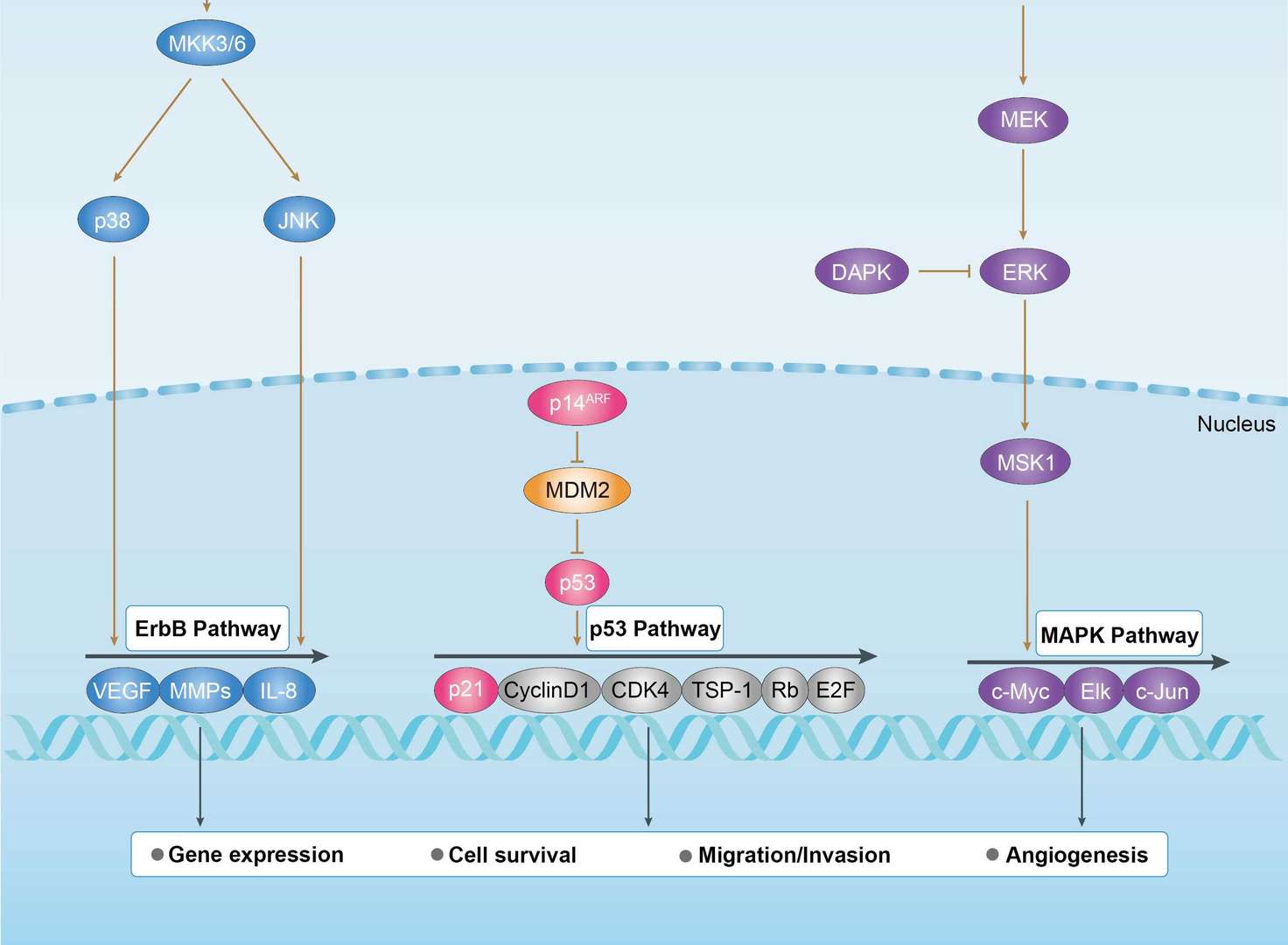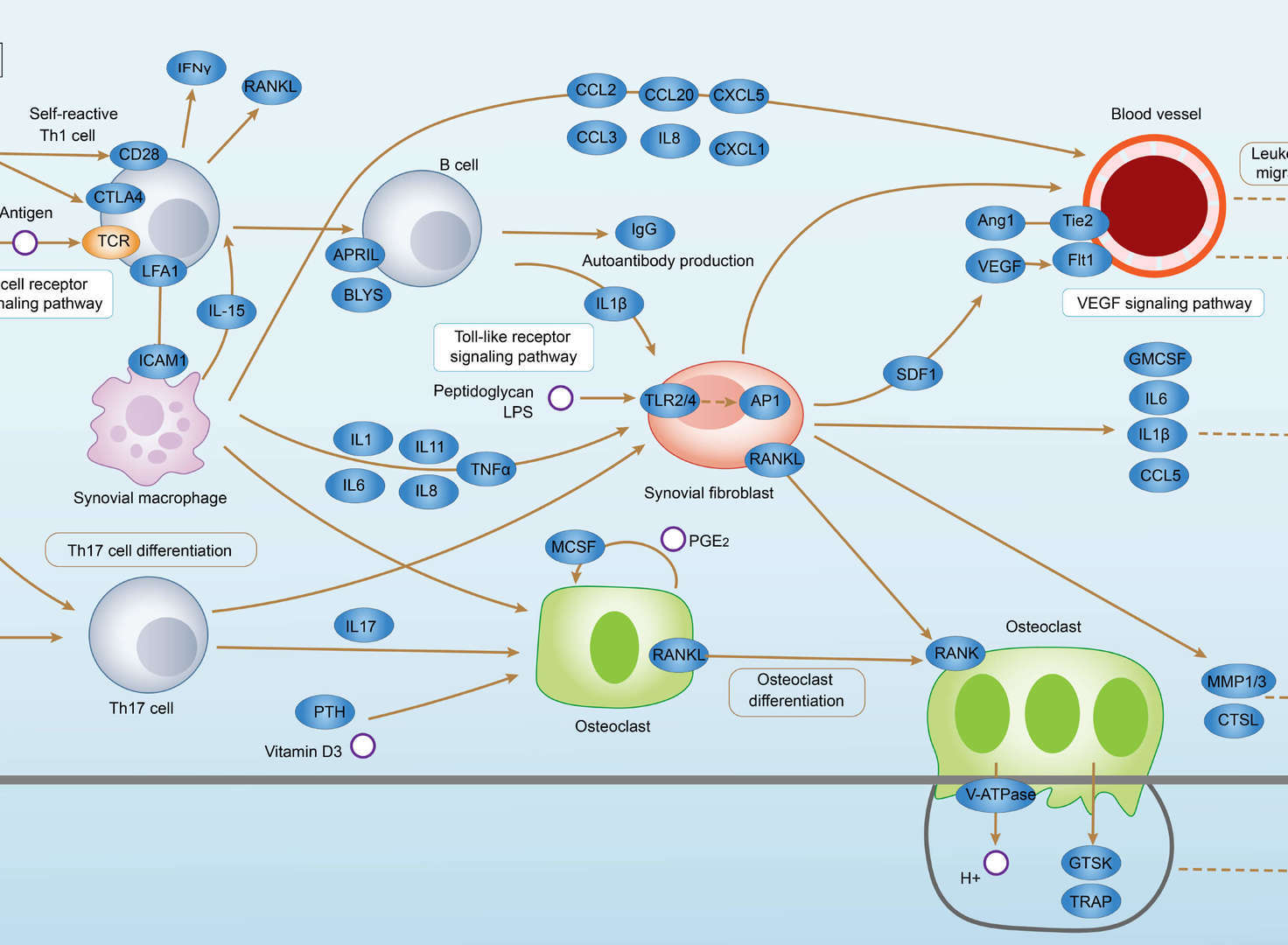Mouse Anti-VEGF Recombinant Antibody (clone A4.6.1)
CAT#: PABW-130
Recombinant Mouse Antibody (A4. 6. 1) is capable of binding to VEGF, expressed in Chinese Hamster Ovary cells (CHO).





Specifications
- Immunogen
- Human Vascular endothelial growth factor
- Host Species
- Mouse
- Type
- Mouse IgG
- Specificity
- Human VEGF
- Species Reactivity
- Human
- Clone
- A4.6.1
- Applications
- Neut, ELISA, Inhib, ICC, WB
Product Property
- Purity
- >95% as determined by SDS-PAGE and HPLC analysis
- Concentration
- Please refer to the vial label for the specific concentration.
- Storage
- Centrifuge briefly prior to opening vial. Store at +4°C short term (1-2 weeks). Aliquot and store at -20°C long term. Avoid repeated freeze/thaw cycles.
Applications
- Application Notes
- The VEGF antibody has been reported in applications of Neutralization, Enzyme-linked Immunosorbent Assay, Inhibition, Immunocytochemistry, Western Blot.
Target
- Alternative Names
- Vascular endothelial growth factor; VEGF
Customer Review
There are currently no Customer reviews or questions for PABW-130. Click the button above to contact us or submit your feedback about this product.


Q&As
-
What are the recommended research applications for the Mouse Anti-VEGF Recombinant Antibody (clone A4.6.1)?
A: This antibody is highly suited for a variety of laboratory techniques such as Neutralization, ELISA, Immunocytochemistry (ICC), and Western Blot (WB) applications. It allows researchers to examine VEGF levels and investigate its role in processes like angiogenesis, which is particularly relevant in cancer research and vascular biology studies.
-
What are the storage and handling recommendations for maintaining the stability of this antibody?
A: For optimal stability, store the antibody at +4°C for short-term (1-2 weeks) and at -20°C for long-term storage. It's important to aliquot the antibody upon first receipt to avoid repeated freeze-thaw cycles, which could adversely affect its performance.
View the frequently asked questions answered by Creative Biolabs Support.
Cite This Product
To accurately reference this product in your publication, please use the following citation information:
(Creative Biolabs Cat# PABW-130, RRID: AB_3111686)
Submit Your Publication
Published with our product? Submit your paper and receive a 10% discount on your next order! Share your research to earn exclusive rewards.
Related Diseases
Downloadable Resources
Download resources about recombinant antibody development and antibody engineering to boost your research.
Product Notes
This is a product of Creative Biolabs' Hi-Affi™ recombinant antibody portfolio, which has several benefits including:
• Increased sensitivity
• Confirmed specificity
• High repeatability
• Excellent batch-to-batch consistency
• Sustainable supply
• Animal-free production
See more details about Hi-Affi™ recombinant antibody benefits.
Datasheet
MSDS
COA
Certificate of Analysis LookupTo download a Certificate of Analysis, please enter a lot number in the search box below. Note: Certificate of Analysis not available for kit components.
See other products for "Clone A4.6.1"
- CAT
- Product Name
See other products for "VEGF"
Select a product category from the dropdown menu below to view related products.
| CAT | Product Name | Application | Type |
|---|---|---|---|
| MOB-1036 | Recombinant Anti-VEGF Antibody | ELISA, WB, Dot, FuncS | IgG |
| CAT | Product Name | Application | Type |
|---|---|---|---|
| MOB-1036-F(E) | Recombinant Anti-VEGF Antibody Fab Fragment | RIA, IF, FuncS | Fab |
| CAT | Product Name | Application | Type |
|---|---|---|---|
| MOB-1036-S(P) | Recombinant Anti-VEGF Antibody scFv Fragment | ELISA, WB, IP, FuncS | scFv |
| CAT | Product Name | Application | Type |
|---|---|---|---|
| MHH-1036 | Recombinant Human Anti-VEGF Antibody | ELISA, WB, FC, FuncS | IgG |
| CAT | Product Name | Application | Type |
|---|---|---|---|
| MHH-1036-F(E) | Recombinant Human Anti-VEGF Antibody Fab Fragment | ELISA, IF, FuncS | Fab |
| CAT | Product Name | Application | Type |
|---|---|---|---|
| MHH-1036-S(P) | Recombinant Human Anti-VEGF Antibody scFv Fragment | ELISA, IP, FuncS | scFv |
| CAT | Product Name | Application | Type |
|---|---|---|---|
| TAB-658CL | Human Anti-VEGF Recombinant Antibody (TAB-658CL) | ELISA | Human IgG |
| CAT | Product Name | Application | Type |
|---|---|---|---|
| PABZ-130 | Mouse Anti-VEGF Recombinant Antibody (clone 12) | ELISA, Neut | Mouse IgG |
| CAT | Product Name | Application | Type |
|---|---|---|---|
| PABC-131 | Human Anti-VEGF Recombinant Antibody (clone B20-4) | ELISA, Neut, Block | Human IgG |
| CAT | Product Name | Application | Type |
|---|---|---|---|
| PFBZ-130 | Mouse Anti-VEGF Recombinant Antibody (clone 12); Fab Fragment | ELISA, Neut | Mouse Fab |
| CAT | Product Name | Application | Type |
|---|---|---|---|
| PFBW-130 | Mouse Anti-VEGF Recombinant Antibody (clone A4.6.1); Fab Fragment | Neut, ELISA | Mouse Fab |
| CAT | Product Name | Application | Type |
|---|---|---|---|
| PFBC-131 | Human Anti-VEGF Recombinant Antibody (clone B20-4); Fab Fragment | ELISA, Neut, Block | Human Fab |
| CAT | Product Name | Application | Type |
|---|---|---|---|
| PSBZ-130 | Mouse Anti-VEGF Recombinant Antibody (clone 12); scFv Fragment | ELISA, Neut | Mouse scFv |
| CAT | Product Name | Application | Type |
|---|---|---|---|
| PSBW-130 | Mouse Anti-VEGF Recombinant Antibody (clone A4.6.1); scFv Fragment | Neut, ELISA | Mouse scFv |
| CAT | Product Name | Application | Type |
|---|---|---|---|
| PSBC-131 | Human Anti-VEGF Recombinant Antibody (clone B20-4); scFv Fragment | ELISA, Neut, Block | Human scFv |
| CAT | Product Name | Application | Type |
|---|---|---|---|
| TAB-0345CL | Anti-Human VEGF Recombinant Antibody (4D3) | ELISA, FuncS, Inhib |
| CAT | Product Name | Application | Type |
|---|---|---|---|
| TAB-0346CL | Anti-Human VEGF Recombinant Antibody (FD006) | ELISA, PK, Inhib, IHC, WB | Human antibody |
| CAT | Product Name | Application | Type |
|---|---|---|---|
| TAB-0345CL-S(P) | Anti-Human VEGF Recombinant Antibody scFv Fragment (4D3) | ELISA, FuncS, Inhib |
| CAT | Product Name | Application | Type |
|---|---|---|---|
| TAB-0346CL-S(P) | Anti-Human VEGF Recombinant Antibody scFv Fragment (FD006) | ELISA, FuncS, Inhib | Human antibody |
| CAT | Product Name | Application | Type |
|---|---|---|---|
| TAB-0345CL-F(E) | Anti-Human VEGF Recombinant Antibody Fab Fragment (4D3) | ELISA, FuncS, Inhib |
| CAT | Product Name | Application | Type |
|---|---|---|---|
| TAB-285CQ | Mouse Anti-VEGF Recombinant Antibody (TAB-285CQ) | ELISA, WB, Inhib | Mouse IgG1 |
| CAT | Product Name | Application | Type |
|---|---|---|---|
| TAB-287CQ | Mouse Anti-VEGF Recombinant Antibody (TAB-287CQ) | ELISA | Mouse IgG1, κ |
| CAT | Product Name | Application | Type |
|---|---|---|---|
| TAB-288CQ | Human Anti-VEGF Recombinant Antibody (TAB-288CQ) | ELISA | Chimeric (Mouse/Human) IgG1, κ |
| CAT | Product Name | Application | Type |
|---|---|---|---|
| TAB-289CQ | Human Anti-VEGF Recombinant Antibody (TAB-289CQ) | ELISA | Human IgG1, κ |
| CAT | Product Name | Application | Type |
|---|---|---|---|
| TAB-290CQ | Anti-Human VEGF Recombinant Antibody | ELISA, WB, Neut |
| CAT | Product Name | Application | Type |
|---|---|---|---|
| TAB-293CQ | Anti-Human VEGF Recombinant Antibody (HAB1) | WB | Humanized antibody |
| CAT | Product Name | Application | Type |
|---|---|---|---|
| TAB-294CQ | Anti-Human VEGF Recombinant Antibody (hAB2) | ELISA, Inhib | Humanized antibody |
| CAT | Product Name | Application | Type |
|---|---|---|---|
| TAB-295CQ | Anti-Human VEGF Recombinant Antibody (hAB3) | ELISA, Inhib | Humanized antibody |
| CAT | Product Name | Application | Type |
|---|---|---|---|
| TAB-301CQ | Human Anti-VEGF Recombinant Antibody (TAB-301CQ) | ELISA, FC, IHC, WB | Chimeric (Mouse/Human) IgG1, κ |
| CAT | Product Name | Application | Type |
|---|---|---|---|
| TAB-303CQ | Anti-Human VEGF Recombinant Antibody (TAB-303CQ) | ELISA, WB, Neut |
| CAT | Product Name | Application | Type |
|---|---|---|---|
| TAB-285CQ-S(P) | Mouse Anti-VEGF Recombinant Antibody; scFv Fragment (TAB-285CQ-S(P)) | ELISA, WB, Neut | Mouse scFv |
| CAT | Product Name | Application | Type |
|---|---|---|---|
| TAB-288CQ-S(P) | Human Anti-VEGF Recombinant Antibody; scFv Fragment (TAB-288CQ-S(P)) | ELISA, WB, IHC, Block | Human scFv |
| CAT | Product Name | Application | Type |
|---|---|---|---|
| TAB-301CQ-S(P) | Human Anti-VEGF Recombinant Antibody; scFv Fragment (TAB-301CQ-S(P)) | ELISA, FC, IHC, WB | Human scFv |
| CAT | Product Name | Application | Type |
|---|---|---|---|
| TAB-288CQ-F(E) | Human Anti-VEGF Recombinant Antibody; Fab Fragment (TAB-288CQ-F(E)) | ELISA, WB, IHC, Block | Chimeric (Mouse/Human) Fab |
| CAT | Product Name | Application | Type |
|---|---|---|---|
| Gly-096LC | Recombinant Anti-Human VEGF Antibody (Fc glycosylation) | ELISA | Humanized antibody |
| Gly-143LC | Recombinant Anti-Human VEGF Antibody (Fc glycosylation) | ELISA | Humanized antibody |
| CAT | Product Name | Application | Type |
|---|---|---|---|
| Gly-179LC | Recombinant Anti-Human VEGF Antibody (Non-glycosylated) | ELISA | Human antibody |
| CAT | Product Name | Application | Type |
|---|---|---|---|
| MOR-4485 | Rabbit Anti-VEGF Recombinant Antibody (clone SI581DS) | ELISA | Rabbit IgG |
| CAT | Product Name | Application | Type |
|---|---|---|---|
| HPAB-0307LY | Human Anti-VEGF Recombinant Antibody (clone XPA.10.072) | ELISA, Inhib | Human IgG2 |
| CAT | Product Name | Application | Type |
|---|---|---|---|
| HPAB-J0267-YC | Recombinant Camelid Anti-VEGF Single Domain Antibody (HPAB-J0267-YC) | ELISA, Neut | Camelid VHH |
| CAT | Product Name | Application | Type |
|---|---|---|---|
| HPAB-J0268-YC | Recombinant Camelid Anti-VEGF Single Domain Antibody (HPAB-J0268-YC) | ELISA, Neut | Camelid VHH |
| CAT | Product Name | Application | Type |
|---|---|---|---|
| VS-0825-YC353 | SmartAb™ Recombinant Anti-VEGF pH-dependent Antibody (Clone 4D3) | ELISA, Inhib | Human IgG |
Popular Products

Application: Neut, ELISA, IF, IP, FuncS, FC, ICC

Application: WB, IP, IF, FuncS, FC, Neut, ELISA

Application: WB, FuncS, IF, Neut, ELISA, FC, IP

Application: IP, IF, FuncS, FC, Neut, ELISA, ICC

Application: WB, FC, IP, ELISA, Neut, FuncS, IF

Application: ELISA, Neut, IF, IP, FC, FuncS

Application: Neut, ELISA, IF, IP, FuncS, FC, ICC

Application: ELISA, FC, IP, FuncS, IF, Neut, ICC

Application: Neut, ELISA, IF, IP, FuncS, FC, ICC

Application: IP, IF, FuncS, FC, Neut, ELISA, IHC

Application: WB, Neut, FuncS
For research use only. Not intended for any clinical use. No products from Creative Biolabs may be resold, modified for resale or used to manufacture commercial products without prior written approval from Creative Biolabs.
This site is protected by reCAPTCHA and the Google Privacy Policy and Terms of Service apply.








 Bladder Cancer
Bladder Cancer
 Rheumatoid Arthritis
Rheumatoid Arthritis











